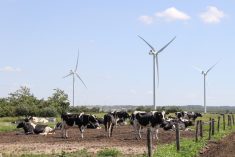Federal private members’ bills with potential significant weight for Canada’s grain, livestock, dairy, poultry, egg, fruit and vegetable producers are now on hold until mid-September at least.
Members of the House of Commons voted June 21 to adjourn until Sept. 18, while the Senate did likewise June 22, to return Sept. 19.
While the two houses of Parliament were able to see to passage and royal assent of the federal budget bill last week among other government legislation, at least three private members’ bills — on which multiple farmer groups have lobbied for months — are now parked for the summer, including:
Read Also

U.S. livestock: Feeder cattle hit contract highs on tight supply
Chicago | Reuters – All Chicago Mercantile Exchange feeder cattle futures and most live cattle futures hit contract highs on…
- Bill C-234, An Act to amend the Greenhouse Gas Pollution Pricing Act;
- Bill C-280, An Act to amend the Bankruptcy and Insolvency Act and the Companies’ Creditors Arrangement Act (deemed trust – perishable fruits and vegetables); and
- Bill C-282, An Act to amend the Department of Foreign Affairs, Trade and Development Act (supply management).
C-234
Introduced Feb. 7 last year in the Commons by Conservative MP Ben Lobb, C-234 passed third reading in the House on March 29 this year. It last appeared in the Senate on June 13, when it passed second reading.
The Senate on June 13 also referred C-234 to the standing Senate committee on national finance, “to examine and report on the subject matter of the bill.” The bill was also referred to the standing Senate committee on agriculture and forestry, which the Senate also authorized to take into account any findings from the finance committee’s study.
C-234 would grant farmers an exemption from federal carbon pricing on propane and natural gas used for drying grain and heating of barns.
Farmer groups including the Alberta Federation of Agriculture, Agricultural Producers Association of Saskatchewan and Manitoba’s Keystone Agricultural Producers had called on the Senate on June 13 to pass the bill before breaking for the summer.
“We understand that senators are looking forward to enjoying the summer season. Prairie farmers want to enjoy theirs by knowing this bill is passed so they can look forward to the fall harvest,” APAS president Ian Boxall said at the time in a joint release.
“If we experience a wet harvest like 2019, I have real concerns about the added burden farms across Saskatchewan and the Prairies will be forced to absorb.”
C-280
Introduced on June 8 last year by Conservative MP Scot Davidson, C-280 passed second reading in the Commons on May 17 this year and was referred at that time to the Commons standing committee on agriculture and agri-food.
Several Canadian produce growers’ groups said last Thursday in a joint release that they were “thrilled” to then see the committee pass the bill “without amendment and with the support of all political parties” on June 21.
C-280 proposes to set up a “deemed trust,” which the groups described as “a vital financial protection mechanism for fresh produce sellers in Canada.”
Such a trust is meant to help growers of fruits and vegetables secure payment in the event of buyer bankruptcy. “The perishable nature of fresh produce, coupled with the industry’s typically longer payment terms, leave sellers unable to recover losses when faced with buyer bankruptcy,” said the groups, which included the Fruit and Vegetable Growers of Canada, Canadian Produce Marketing Association and Fruit and Vegetable Dispute Resolution Corporation.
“The recent case of Lakeside Produce in Leamington, Ont. serves as a reminder of the urgent need for a financial protection tool to safeguard this essential sector and uphold food security in Canada,” they said.
Such a trust could also help restore Canadian producers’ access to the U.S. Perishable Agricultural Marketing Act Trust (PACA Trust), which provides a protection mechanism to secure payment in case of a U.S. buyer’s bankruptcy.
The U.S. government in 2014 withdrew Canada’s preferred access to the PACA Trust payment dispute arbitration mechanism, unless or until such time as Canada comes up with an equally effective resolution process for buyer defaults.
“Looking ahead to the final rounds of debate and voting in the House of Commons, we are optimistic that all parties will continue to lend their support and work to advance the bill as quickly as possible,” FVGC executive director Rebecca Lee said. The groups acknowledged the bill would not return to the Commons again until this fall.
C-282
Introduced June 13 last year by Bloc Quebecois MP Luc Theriault, C-282 completed third reading in the Commons last week, on June 21, and passed first reading in the Senate the following day.
The bill, Theriault said last year, is meant to “protect supply management from further dilution in future international trade negotiations,” following tariff rate quota concessions granted to imports through the Canada-E.U. free trade agreement (CETA), the Trans-Pacific Partnership (CPTPP) and the Canada-U.S.-Mexico Agreement (CUSMA) which he said “really did a number on this agricultural system.”
The bill would amend existing federal legislation with new provisions to exclude supply management from future trade negotiations.
Groups representing farmers in Canada’s supply-managed dairy, poultry and egg sectors, in a joint release June 22, hailed the bill’s passage in the Commons, saying it would “safeguard the sustainability” of production in those sectors.
However, the Canadian Agri-Food Trade Alliance, which represents producer groups in export-dependent ag sectors, said June 21 its members were “profoundly disappointed” in C-282’s passage in the Commons.
CAFTA president Dan Darling said the bill will diminish Canada’s negotiating hand in future trade negotiations and MPs who voted to pass the bill “have chosen to entrench protectionism and favour one economic sector above all others.” — Glacier FarmMedia Network















